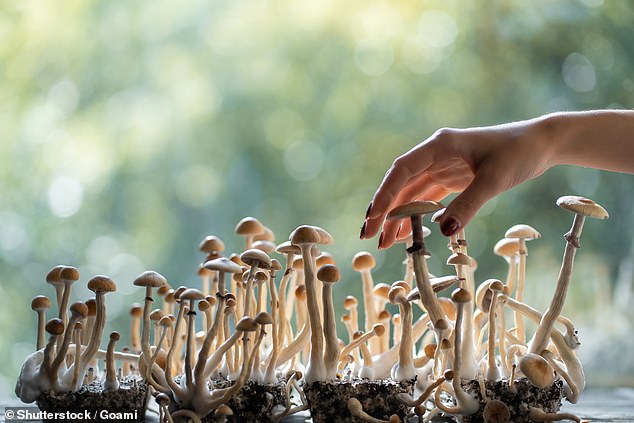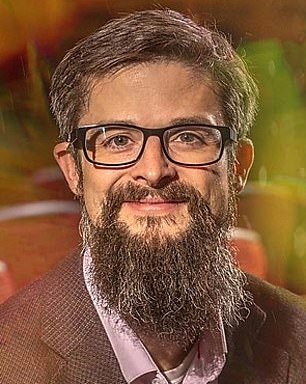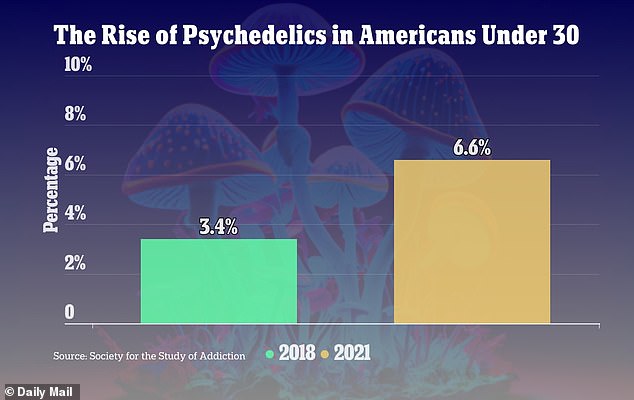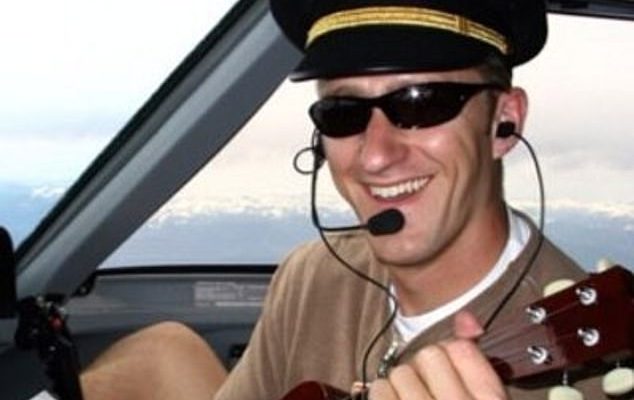A pilot who had previous taken magic mushrooms who nearly cut the engines on a plane mid-flight should serve as a cautionary tale about wide access to psychedelics, experts warn.
Joseph Emerson, an off-duty pilot riding on an Alaska Airlines flight had taken magic mushrooms 48 hours prior to taking off in Everett, Washington to San Francisco when he had a nervous breakdown, nearly cutting off the engines of the plane mid-flight, potentially sending 84 people to their deaths.
The episode has been attributed to a potentially fatal combination of mental illness and magic mushrooms that he had taken about two days prior.
Dr Matthew Johnson, a psychiatrist and psychedelics expert at Johns Hopkins, told DailyMail.com that a small number of people who take the drugs, which should happen under the guise of doctors, will have lasting effects for weeks or even over a year on their mental health.
Dr Johnson, a preeminent expert on psychedelics research, said: ‘There can be events that you don’t see when you run a few thousand people, but, you expose it to 100,000, a million people who use in society, and you have a whole different range of risks.’
Off-duty pilot Joseph Emerson said he had taken magic mushrooms 48 hours prior to hopping on a flight from Washington state to San Francisco. He already had pre-existing mental health issues and had recently suffered the loss of a friend. When combined with psychedelics, this creates the perfect storm for a distressing trip with potentially long-lasting effects

Psilocybin, the psychoactive ingredient in mushrooms, is the most common psychedelic compound used in clinical research
There is no standard dose for any psychedelics, which leaves wide open the possibility that a person taking them will unwittingly take too much, he added.
Previously seen as uniquely a part of hippie culture just the same as the Grateful Dead and anti-war protests, psychedelic drugs have seen a meteoric rise in mainstream popularity recently.
Psilocybin, the psychoactive ingredient in magic mushrooms, as well as other drugs like ketamine, MDMA, and LSD, has been credited in research settings for helping people with post-traumatic stress disorder and in alleviating social anxiety in people with autism.
Psilocybin, the psychoactive ingredient in magic mushrooms, as well as other drugs like ketamine, MDMA, and LSD, has been credited in research settings for helping people with post-traumatic stress disorder and in alleviating social anxiety in people with autism.
Dr Johnson’s research team at Hopkins was the first research undertaking in 50 years to receive financial backing from the federal government, when, in 2021, the National Institutes of Health (NIH) allocated roughly $4 million in grants.

Dr Matthew Johnson of Johns Hopkins University was one of the first government grant recipients for psychedelics research in the US in 50 years
The trials include pre-screening protocols, which make sure people with certain mental health disorders such as bipolar and suicidal ideations are excluded due to the higher risks of having a negative experience.
Experts in psychedelics research fear that as more and more people take them outside of a medical setting without oversight of doctors and mental health professionals to guide people through the trip, the number of distressing episodes like that of the Alaska Airlines pilot could become more commonplace.
In the case of Mr Emerson, he had been dealing with ongoing mental health struggles coupled with the tragic passing of a friend when he took magic mushrooms, creating a perfect storm for harmful behavior changes.
Dr Johnson said that while the risk of such a negative experience appears low: ‘There can be events that you don’t see when you run a few thousand people, but, you expose it to 100,000, a million people who use in society, and you have a whole different range of risks.’
Dr Johnson added: ‘There are also risks that, that can come after it’s out of your system.
‘One of the things that is a little concerning is some people have a naive view that if a drug is out of your system, that it can no longer affect you. In other words, that the blood levels are zero, if you’re not intoxicated anymore, that it can’t affect you.’
Widespread coverage of psychedelics research coupled with legalization efforts have contributed to a rise in their recreationals usage.
This has been borne out in research, with one study conducted by University of Michigan and Columbia University researchers finding that from 2018 to 2021, young people aged 19 to 30 nearly doubled their past-year use of hallucinogenic drugs.
Researchers behind the study said: ‘With increased visibility for medical and therapeutic use, however, potentially comes diversion and unregulated product availability, as well as a lack of understanding among the public of potential risks.’

From 2018 to 2021, the use of psychedelic drugs, other than LSD, has nearly doubled, with rates increasing from 3.4 percent to 6.6 percent
Oregon voters passed a ballot measure in 2020 to decriminalize the use of psilocybin and legalize its use in medically-supervised settings. Several local governments, such as San Francisco, have voted to decriminalize some psychedelics.
It’s also not unheard of to find chocolates infused with psilocybin in New York City smoke shops.
When someone takes magic mushrooms, the psilocybin is converted in the body to psilocin, which binds to serotonin receptors in the brain to create a hallucinatory effect.
Psilocin can also cause over activity in the frontal cortex of the brain, which is the region responsible for helping with the performance of motor tasks as well as high-level cognitive function such as judgement, abstract thinking, and creativity.
This overactive frontal cortex leads to changes in consciousness, altered perceptions, and shifts in thinking patterns.
The duration and intensity of a psychedelic like magic mushrooms varies by person, and most people will do fine. But the experience often entails widening one’s perspective and confronting aspects of their personality that they may have struggled with before the trip.
The feelings of introspection can sometimes lead to the dredging up of traumatic memories or feelings of shame, depression, and guilt lingering after the ‘high’ subsides.
For this reason, the effects can last hours to months and, in rare cases, over a year, after the acute effects have worn off.
With psilocybin, the psychoactive compound in magic mushrooms, people have reported lingering anxiety, fear, existential dread, and depersonalization, or a sensation of viewing oneself from outside the body.
Dr Elinor Greenberg, a licensed psychologist who specializes in personality disorders and psychosis told DailyMail.com: ‘What happens with a lot of psychdedelics is it opens the doorway between you and what you don’t want to see about you, or you see yourself at a different angle’ leading to lasting feelings of distress.
A recent study published in the journal PLOS One culled records from over 600 people’s experiences following the use of psilocybin, LSD, ayahuasca, cannabis, MDMA, DMT, ketamine, mescaline, and salvia.
One person interviewed for the study said: ‘Almost exactly 2 months after the trip, something happened. I was in a restaurant and all of a sudden I began to feel like something was wrong. I went to the bathroom. All of a sudden, the bathroom was not real. It just looked WRONG. I had to get out of there. But when I left the restaurant, the street outside was not real either. The whole world was simply not real, and I felt like I had to vomit.’
Another said: ‘I stayed up for 3 days after dosing and went into psychosis, I believed all my friends were ‘spies’ talking to me to make fun of me. I was also throwing stuff at the wall and talking about wanting to kill myself on Day 3. This belief persisted until I’d been on an antipsychotic for months.’
The fact that people had lasting effects well after taking the drugs was not particularly surprising to Dr Johnson, who noted that even if there is no evidence of the drug in the person’s blood after a trip ends, it will have unlocked a part of their thinking that stays with them.
Dr Johnson told DailyMail.com: ‘I want to remind those folks that the entire point, the exciting thing that comes with this exciting new research area of psychedelic treatment is that we can provide one, two or three treatments and see positive behavioral and mental benefits a month, six months, a year or more later.
‘So the very potential of therapeutics that we’re so excited about hinges on the fact that you can have effects on behavior that go well beyond the intoxication, the duration of acute effects.’
It’s when a person takes the drug recreationally outside of a medical setting, or if they have an underlying psychotic disorder, that problems arise.
In the PLOS One study conducted bmost common settings in which people took the psychedelics were ‘with a friend, partner, or group of friends’ or ‘on my own’, a recipe for disaster according to Dr Johnson.
He said: ‘The psychedelics are very much dependent on the safety factors that are at play in the [clinical] treatment, which involves screening people. So there are certain disorders that we strongly suspect, or have some evidence that would be too dangerous or too risky to expose people with a certain type of disorder to a compound.
For instance, people with high blood pressure would be discouraged from taking psychedelics, as the most common side effect is an elevation of blood pressure and heart rate.
Psychedelics could also be dangerous for people with bipolar disorder or schizophrenia, as they could trigger a manic episode. For that reason, people with these disorders are excluded from clinical trials.
Dr Johnson added: ‘I should say, the backdrop to all this, that we haven’t seen cases in the well run, prepared, monitored clinical research studies. So, thankfully, we’re not seeing this in the field, but that is very likely, because we have those safeguards in place.’
Psychedelics have a dark side, but they have shown great promise in clinical research when combined with traditional therapy in alleviating PTSD symptoms in veterans and helping people with severe anxiety.
And the drugs have received high-profile attention in recent years, with celebrities such as Prince Harry taking them and football player Aaron Johnson crediting shrooms for giving him his ‘best season’ in the NFL.
And Gwyneth Paltrow’s wellbeing website Goop.com promotes a fancy ayahuasca retreat in Costa Rica, Joe Rogan often lauds DMT in his podcasts and Tesla founder Elon Musk has posted that psychedelics make a ‘real difference to mental health … we should take this seriously’.
The drugs have even gained praise from some unexpected sources, such as Republican congressman Morgan Luttrell from Texas, an ex-Navy SEAL, who said psychedelics saved his life and his marriage.
Rep Luttrell said: ‘’If you find yourself in a place that you were lost, and no other modalities have worked, this could possibly be that tool.
‘And I can honestly stand in front of all of you and the American public and say I was reborn. This changed my life. It saved my marriage. It is one of the greatest things that ever happened to me.’
A new bipartisan bill led by Rep. Dan Crenshaw – also a Republican and former Navy SEAL from Texas – would create a $75 million research grant program to study the therapeutic side of mushrooms.

